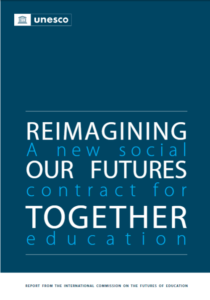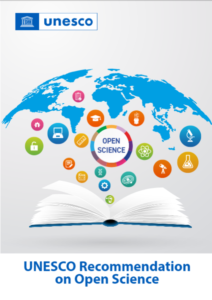The UNESCO General Conference: recognising libraries as partners in culture, education, and access to information
25 November 2021
UNESCO’s 41st General Conference has ended. This biennial meeting brings together representatives of the Member States, alongside observers from non-Member States, intergovernmental organisations, and non-governmental organisations, to determine the policies and the main lines of work of UNESCO.
Over the past two weeks, UNESCO’s 193 Member States came to several important decisions. These include issues concerning the future work of the organisation, global education policy, the ethics of artificial intelligence, and the need to work towards greater openness of scientific information.
IFLA attended the General Conference as an observer. Here, we participated in meetings of several Commissions focused on different subject areas, met with key contacts, and set out the potential of the library field in helping to meet goals set by the Member States.
There are a multitude of areas on which libraries can have an impact, and several UNESCO decisions that support the work that libraries are already doing.
What follows is a brief overview. Stay tuned in the coming months as we provide additional insight into how libraries can engage.
Education
Report on the Futures of Education
During the General Conference, UNESCO launched the Report on the Futures of Education.
At the heart of the report is a call to reform curricula and teaching methods to account for the needs and challenges of today. Specifically, it calls for a human-rights focus in education that centres respect for cultural diversity, the integration of environmental education, and an increased focus on digital literacy skills.
This requires both formal and non-formal education providers, and libraries are included.
- It calls for new education landscapes, which include local leaders, elders, authorities, communities and families, social workers, guidance counsellors, special education resources, librarians, and literacy specialists – each contributing their unique values.
- It stresses that early childhood education is achieved together – and the youngest learners and their families can benefit when daycare centres, libraries, museums, community centres, and parks are well-funded and treated as essential public services. For libraries, this is especially important, as the report goes on to stress the critical role of building literacy and reading skills in young learners.
Read the full report here: Report on the Futures of Education
Global Education Meeting and the Paris Declaration
On 10 November, UNESCO hosted the Global Education Meeting, organised in conjunction with the French government.
In this meeting, Heads of State and Government, ministers, and delegates from more than 40 countries adopted the Paris Declaration. This Declaration calls for increased investment in education in light of the COVID-19 pandemic, and accelerated progress towards fulfilling the Education 2030 agenda.
Included in this Declaration are several points relevant to libraries:
- The Declaration reiterates the importance of multilateral cooperation and multi-stakeholder engagement in “advocating education as a key response to recovery from the COVID-19, building resilient, inclusive, innovative and gender-transformative education systems and societies”. Count libraries in!
- The Declaration urges governments to develop strategies to increase resources for education, ensure inclusive and equitable quality education and promote lifelong learning opportunities for all. Libraries must be included in these strategies.
Read the Paris Declaration.
New Recommendations
Recommendation on Open Science
The General Conference adopted the UNESCO Recommendation on Open Science, which defines shared values and principles for Open Science and identifies specific measures on Open Access and Open Data.
With the adoption of this Recommendation, Member States, alongside key stakeholders in science and information management, will work towards enabling universal access to scientific knowledge, and foster greater international cooperation to work towards this goal.
Libraries are an important part of the infrastructure allowing for open access to scientific knowledge.
Read the full Recommendation: UNESCO Recommendation on Open Science.
Recommendation on the Ethics of Artificial Intelligence
UNESCO has also adopted this Recommendation, creating the first ever international guidelines on the ethics of the development and use of artificial intelligence.
This Recommendation stemmed from the need to ensure a human-centred approach to this new technology – to ensure it benefits humanity as a whole.
Find out more: The Ethics of Artificial Intelligence.
Culture
IFLA joined the meeting of the Culture Commission, in which Member States discussed key issues, including the consideration and adoption of the Culture Programme for 2022-2025.
We were enthusiastic to see that IFLA was specifically named in the Culture Programme among UNESCO’s institutional partners. This is positive, as the Programme for 2022-2025 has a strong emphasis on reinforcing partnerships and working together to achieve shared goals.
World Novel Week
The General Conference has decided to name the week from 13 October of each year as World Novel Week.
IFLA took the floor to congratulate UNESCO on this initiative. The values of this week – appreciation of literature, celebration of diverse cultural expressions, and promotion of reading and literacy – are close to the heart of the work that libraries do.
As the global voice of libraries, IFLA stands ready to assist UNESCO in facilitating information-sharing on the various celebrations around the world, and in promoting side events within our global membership. Stay tuned for more information and ideas on how to celebrate this week.
Communication and Information (CI)
During the CI Commission meetings, Member States also considered and adopted the Communication and Information Programme for 2022-2025.
IFLA congratulated UNESCO for the intersectoral and human rights-based approach to the Programme for 2022-2025, especially regarding efforts to further establish linkages between freedom of expression and the protection and promotion of the diversity of cultural expressions, namely through promotion of linguistic diversity.
We stressed that libraries sit very much at this intersection, and welcomed further exploration into linkages between freedom of expression and cultural rights, academic, scientific and artistic freedoms – especially concerning access to cultural expressions and heritage – including documentary heritage, and the knowledge they transmit.
The Communication and Information Commission emphasised that defense of fundamental freedoms and public access to information are among the key drivers to achieve all Sustainable Development Goals. IFLA echoed this and stressed that upholding these values are required to build resilience by enabling informed and inclusive responses to challenges.
We further stated that supporting platforms which allow all people to access information and lifelong learning opportunities is an important aspect of achieving this objective – and that libraries can be such platforms.
We look forward to continuing our close work with the Communication and Information Sector to meet these goals.
Looking Ahead
The Joint Meeting of Commissions approved UNESCO’s next Medium-term Strategy for 2022-2029. The Programme for 2022-2025 provides specific actions that will help impact on this Strategy.
Looking ahead, IFLA will continue to refer to this Strategy, and specifically to the Programme for 2022-2025, to identify areas on which we can collaborate and highlight the impact of libraries.
We look forward to the opportunity to continue demonstrating how the library field helps UNESCO achieve its goals in education, culture, access to information, and beyond.
Please contact us for more information: [email protected]